28th August 2019 Skopje, North Macedonia
Poetry, education, diverse cultures and traditions – my first visit to Struga
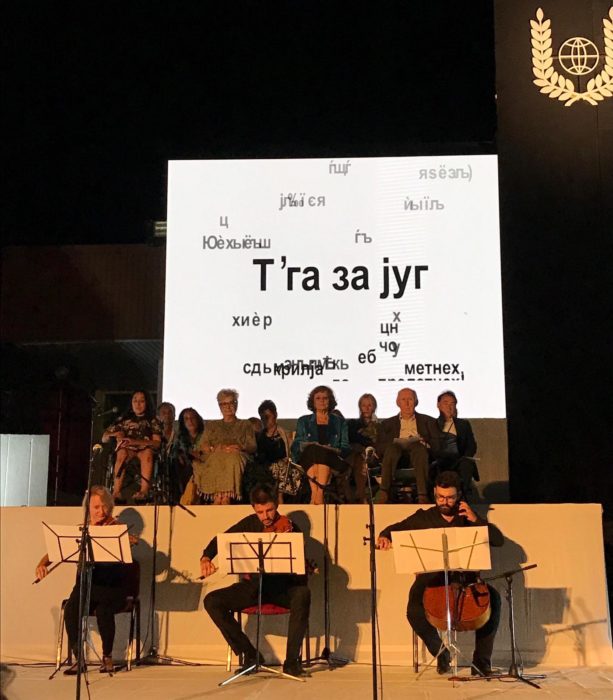
As much as I enjoy living and working in Skopje, it’s always a great pleasure when I get to visit other places across the country. Last week I had the honour of attending the opening of the Struga Poetry Festival, the world’s oldest consecutive running poetry festival. It was moving to hear poets from around the world use such different language and languages to evoke emotion and story.
But I could not go to the poetry festival and not to take the opportunity to see Struga itself. Myself and my colleagues from the Embassy were a little jealous as we went between meetings seeing all the people enjoying the cool waters of the lake and drinking coffee in the breeze. However we still got a flavour of the city.
Meeting with Mayor Ramiz Merko, we spoke about the efforts and opportunities to build on Struga’s natural beauty and diverse cultures and traditions for the interests of all its people. Local government has an obligation to meet the citizens’ needs. Everyone I talk to across the country are proud of the area’s UNESCO status and the beauty of the Ohrid lake, River Drim, Sv. Naum, and Struga and Ohrid themselves. I was pleased to hear that the Council of Struga has unanimously supported the Action Plan to safeguard the UNESCO status of the Ohrid Region.
As well as caring about their environment, the people I meet talk about the importance of education. It was great therefore to visit primary school “Brakja Miladinovci”. We were warmly welcomed by the school Director Mrs. Šate and also spoke to a full classroom of enthusiastic teachers eager to start the three-day training on development of critical thinking and coding skills as part of our 21st Century Schools project. A project which will provide this training for pupils in every primary school in North Macedonia.
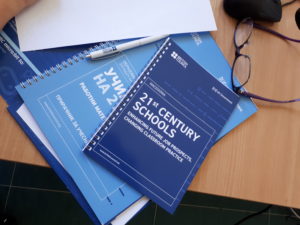
Our Embassy Chevening Officer Bela joined me in Struga to deliver a presentation on our UK Government funded Chevening Scholarship programme to local professionals and interested applicants at the cultural centre ‘Kombinati.’ She highlighted that the scholarship supports one year taught masters degrees for individuals with demonstrable potential to become future leaders, decision-makers, and opinion formers. She presented the benefits of becoming a Chevening Scholar, the criteria to apply, application timeline and our Macedonian Chevening Alumni network that we are very proud of and work closely with. As the application period is open till 5 November I would like to encourage any interested applicants to submit their application: www.chevening.org/apply.
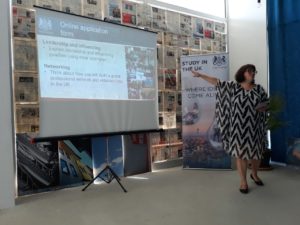
I had the pleasure of meeting the country’s first Foreign Minister after independence, Denko Maleski, over coffee in the peaceful setting of his home in Struga. It was fascinating to hear about his experiences of the last 30-plus years, from the challenges facing Yugosalvia in the late 1980s, through the negotiations of early independence in the 1990s to the developments, hurdles and successes of the present day.
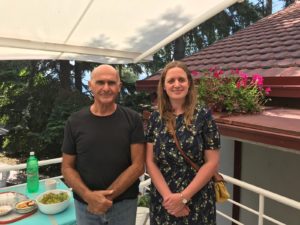
I also met local footballing legend Artim Šakiri for lunch at a restaurant along the Struga lakefront. We discussed the importance of sport, his own journey into football and the Great British weather, which he had experienced during his two years at West Bromwich Albion FC. I also had my first taste of ‘gjomleze’ – a simple yet satisfying pastry dish, common throughout the southwest of the country. We also both spoke of how much our children enjoy North Macedonia and all it has to offer.
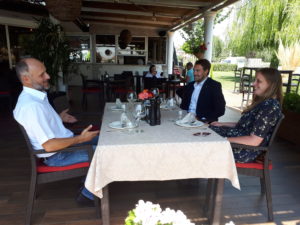
For the last part of my visit, we drove about 20 minutes northwest of Struga, to the large village of Labunishta. I was greeted by members of the local community, the Mayor of Struga and many others on arrival. I entered the newly refurbished library and was struck by a series of slideshow images which highlighted the painstaking transformation from an under-utilised building to a sparkling new library space. This was all down to the hard work of young people in the community, supported by our project implementer, IOM. I got to hear first-hand, how the volunteers had developed such a modern library with limited time, tools and resources. It was an impressive feat! The library now offers a sizeable learning space, with a small but growing selection of literature, which I hope will provide the young people of Labunishta with learning and inspiration for many years to come. As an added extra, a very talented voice from Labunishta showed us that a library can be more than just books, as we were serenaded with a beautiful rendition of “Vetëm Ty” by Alban Skenderaj, performed on this occasion by Mahir Asani.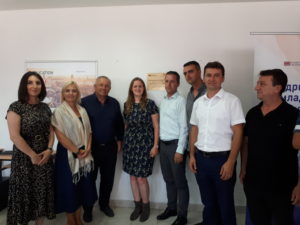
My next plan is to go back to Struga for a visit with my family and this time take the chance to swim.
